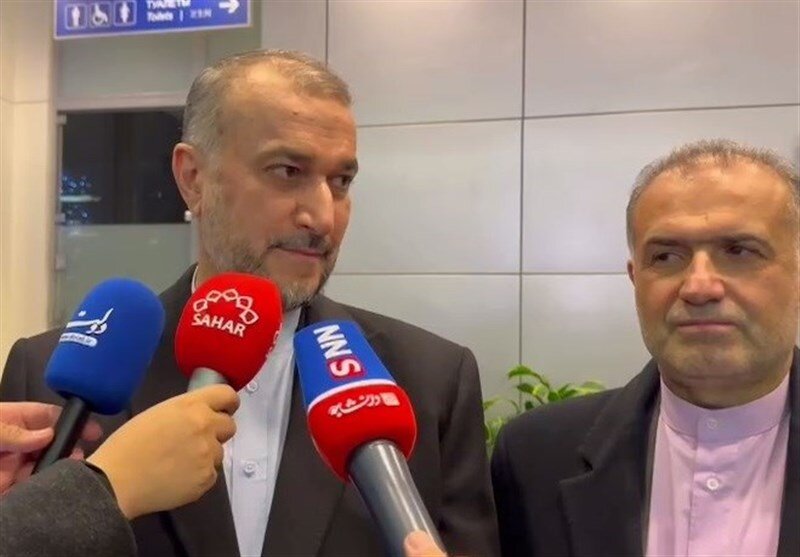Hamas at the pinnacle of popularity, Amir Abdollahian says

TEHRAN- Iran’s foreign minister has emphasized that Hamas is now enjoying its highest level of popularity and that neither the U.S. nor the Israeli regime can crush the Palestinian resistance group.
Speaking to reporters in Moscow on Tuesday at the end of the annual summit of the Caspian Sea foreign ministers (Caspian Five), Amir Abdollahian said, “The U.S. and the Zionist regime are incapable of either eliminating Hamas and the resistance or making decisions instead of the people of Palestine and Gaza.”
The comments were made amidst the Israeli regime’s ongoing war against the Gaza Strip, which began on October 7.
In an interview aired on Monday, Kamal Kharrazi, chief of Iran’s Strategic Council on Foreign Relations (SCFR), told Al Jazeera that “Hamas is an ideology” and “it is basically wishful thinking by Israelis to eradicate Hamas.”
Throughout the war, authorities from both Israel and the United States have hinted that Hamas could not ultimately take control of the coastal strip.
The Hamas movement, which won democratic elections and went on to rule the region in 2006, has declared it can hold the region for months despite the fierce assault.
Amir Abdollahian said Hamas “is at the height of popularity today” and is capable of resisting the Israeli army “for months and continue its daytime and nighttime retaliatory attacks” in response to “the Zionists’ atrocities”.
“Leave Palestine to Palestinians”
He also stressed that the U.S. believes it can make decisions for the post-war Gaza, advising Washington to abandon its “strategic mistake.”
The chief diplomat added, “Leave Palestine to Palestinians, and thus avoid another great regional defeat for America, especially on the verge of the U.S.’s presidential elections.”
“Tehran, Baku working to create balanced relations”
On the sidelines of the Caspian Sea foreign ministers, Iran’s top diplomat held talks with certain counterparts.
In a meeting with his Azerbaijani counterpart Jeyhun Bayramov, Amir Abdollahian noted that Tehran-Baku relations are on the correct path, and the two sides are working to create balanced cooperation in all spheres.
“Tehran and Baku are seeking to have balanced relations in the economic, cultural, political, security and tourism sectors, and in the sectors where the speed of progress has been slower, work will be pursued more quickly,” he explained.
The top Iranian diplomat mentioned President Ebrahim Raisi's recent meeting with Ilham Aliyev, the President of Azerbaijan, and said that both countries’ authorities had come to a good agreement regarding the comprehensive development of economic relations, the opening of corridors, trade cooperation, and the implementation of incomplete joint projects.
He went on to emphasize that in order to quicken the pace of bilateral collaboration, the two nations are looking to intensify their links in the areas of economy, culture, politics, security, and tourism.
In an assembly of top diplomats from the Caspian littoral states on Tuesday, Amir Abdollahian delved into a spectrum of crucial issues, underscoring the imperative of enhanced regional collaboration.
He portrayed the Caspian Sea as not merely a geographical entity but a shared heritage and a fount of prosperity for the approximately 270 million people in the five countries bordering the sea.
Emphasizing the strategic importance of the Caspian Sea which acts as a connective nexus between the northern-southern and eastern-western corridors, he pressed for the establishment of security in the Caspian Sea region. His impassioned plea urged joint responsibility among the littoral nations, emphasizing the overarching need for stability, security, and sustainable development.
“Decisions regarding Caspian Sea issues should be unanimous among the five littoral countries,” Amir Abdollahian declared, expressing his belief in the necessity of increased collaboration. He proposed the institutionalization of collaborations in the Caspian Sea and suggested establishing a secretariat or organization to manage and oversee collaborative efforts.
The top Iranian diplomat articulated Tehran’s firm support for economic development in the maritime sector.
He fervently advocated for joint investments in shipping, ports, fisheries, maritime tourism, and the creation of free trade zones within the Caspian Sea.
Acknowledging the environmental challenges that loom over the region, the Iranian foreign minister championed collective cooperation as the panacea for these shared challenges.
